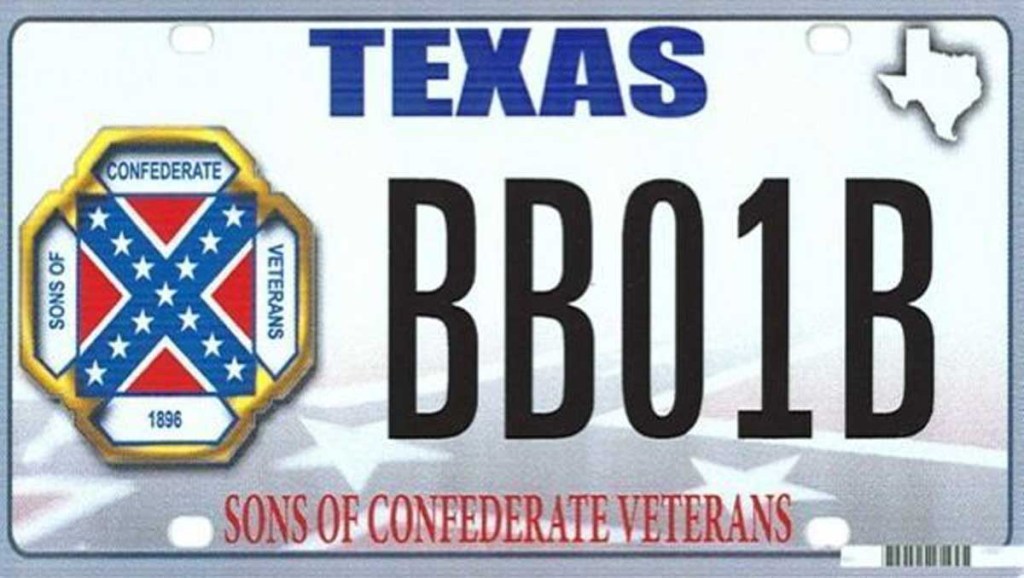Supreme Court rejects Confederate license plates
Published 6:30 pm Thursday, June 18, 2015

- The Texas chapter of the Sons of Confederate Veterans proposed this specialty plate. On Thursday, the U.S. Supreme Court upheld the state's right to reject the design.
AUSTIN – The Sons of Confederate Veterans’ Texas chapter lost a legal battle Thursday but vowed to keep fighting for a specialty license plate that identifies its supporters and raises money for the group.
Trending
“Well, sir, the whole thing was to honor our ancestors,” said Gary Bray, who heads the Texas chapter.
The organization’s members are disappointed but undaunted, he said.
“We will probably regroup and come back with another design,” he said.
It’s unclear how far they’ll get, however.
Ruling against the Sons of Confederate Veterans yesterday, a majority of the U.S. Supreme Court held that Texas’ motor vehicle department can refuse to issue plates bearing the group’s proposed design – a square Confederate battle flag framed by the words “Sons of Confederate Veterans 1896” – because specialty tags constitute government speech.
“Texas license plates are, essentially, government IDs,” wrote Justice Stephen Breyer for a 5-4 majority of justices. The majority included Justice Clarence Thomas, the court’s sole African-American, who abandoned his usual conservative position to side with the court’s liberals.
Trending
“A person who displays a message on a Texas license plate likely intends to convey to the public that the state has endorsed that message. If not, the individual could simply display the message in question in larger letters on a bumper sticker right next to the plate,” Breyer wrote.
The group filed its request for a specialty plate in 2009, which the state rejected. The group sued and argued that the state trampled upon its First Amendment rights.
In a dissenting opinion, Justice Samuel Alito asked whether someone on a Texas highway who saw a “Rather Be Golfing” plate whiz by on a Monday morning would think: “This is the official policy of the state – better to golf than to work?”
While the conflict in the case, Walker v. Texas Division Sons of Confederate Veterans Inc., focused on whether license plates represent government speech or private speech, the case was a reminder of problems that Texas has faced disentangling historical observance from politics.
The University of Texas at Austin has seen protests over a statue of Confederate President Jefferson Davis since the 1960s. This spring, students again demanded removal of the figure from its prominent place facing the campus’ south mall.
Davis is also depicted in a monument to Confederate soldiers on the Capitol grounds.
The statue on the Capitol grounds prompted Sen. Rodney Ellis, D-Houston, who is black, to tell planners they needed to create a monument to Texans who are African-Americans and Mexican American. There is now a Tejano monument, but as yet none commemorate Texans who are African-American.
Another statue on the Capitol grounds including a tribute to Hood’s Texas Brigade; its shaft features a carved Confederate flag.
In 2010, then-Texas Land Commissioner Jerry Patterson issued a statement when the was rededicated noting that the state’s Capitol is itself a monument to the Confederacy.
“Texas can’t look away from that history,” he said.
Bray said controversy over his group’s request for a specialty plate has been misinformed.
“Most people don’t realize there’s more than one Confederate battle flag,” he said. “Our own state flag was a Confederate battle flag, used by Texas troops in Virginia by Hood’s brigade. In every public school, every day, they’re flying a Confederate battle flag.”
But Robert Maberry Jr., a retired history professor and author of “Texas Flags,” said that the saga of the flag carried by Hood’s troops is a bit complicated.
“Yes, Confederates flew the flag, but it’s the flag of the Republic of Texas,” from 1839, he said. The design did not originate with the Confederacy.
The state issues a variety of specialty plates, such as those raising awareness of drunken driving and others promoting the citrus industry. Plates are commissioned by the Legislature or prompted by groups and private interests.
Motorists pay $30 extra for the tags, and a portion of the money can be diverted to a cause.
The state has issued about 21,000 “Save Texas Ocelots” plates, for example. Of the $30 fee, $22 goes to the state’s parks and wildlife department.
John Austin covers the Texas Statehouse for CNHI’s newspapers and websites. Contact him at jaustin@CNHI.com.


